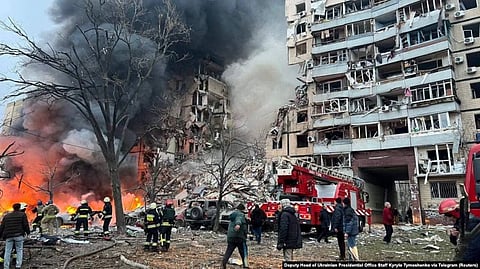In his nightly video address on January 13, Zelenskiy rejected claims by Russia's Defense Ministry that it captured the strategically important salt-mining town in the eastern Donetsk region.
"The tough battle for the Donetsk region continues. The battle for Bakhmut and Soledar, for Kreminna, for other towns and villages in the east of our country continues," Zelenskiy said. "Although the enemy has concentrated its greatest forces in this direction, our soldiers -- the Armed Forces of Ukraine, all defense and security forces --- are protecting the state."
The capture of Soledar, which could give Russian forces a hub to cut off Ukrainian supply lines while also providing a staging ground for attacks on the nearby city of Bakhmut, would be Moscow's most substantial military gain in its war against Ukraine in months.
Kyiv and Washington, however, have suggested the heavy loss of Russian troops and the destruction of the city have lessened Soledar's strategic value.
The Russian Defense Ministry has claimed hundreds of Ukrainian soldiers have been killed in heavy fighting in Soledar this week. Ukrainian officials have said more than 500 civilians are trapped inside the town, including 15 children.
The private and controversial Russian mercenary group Vagner is reportedly heavily involved in the Russian effort to capture Soledar.
After initial success in taking Ukrainian territory after Russia's all-out invasion in February, the Russian military suffered setbacks in the south and the eastern Donbas region. The Russian military has focused on Soledar as key to the success of its new offensive.
The head of the eastern Kharkiv region, Oleh Synehubov, said the regional capital, Kharkiv, was hit by two Russian S-300 missiles early on January 14.
The strikes hit energy infrastructure and industrial in the city, Ukraine's second-largest, according to Synehubov.
In western Ukraine, Maksym Kozytskiy, head of the Lviv regional military administration, said "a critical infrastructure facility" had been hit in the region and warned of electricity and water supply disruptions. Lviv, far away from the front lines, had in the past been spared much of the damage seen in other parts of the country.
Strikes were also reported in the southern Zaporizhzhya region, home to Europe's largest nuclear power plant.
In Dnipro -- with a pre-war population of nearly 1 million -- a strike on a residential building killed at least five people and injured dozens, according to regional officials.
"There are five dead already," regional Governor Valentyn Reznichenko said on Telegram, adding that nearly 60 people were hurt, including 12 children.
Zelenskiy, in a Telegram posting, said, "Eternal memory to all whose lives were taken by Russian terror! The world must stop this evil."
“We will find everyone involved in this terror. Everyone will bear responsibility. Utmost responsibility,” he added. (KB/RFE-RL)


